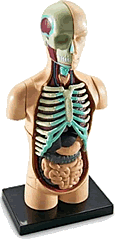
Overview of the Digestive Process
One simple way to describe the digestive process is in terms of the following stages (other sources may identify fewer or more 'main stages' according to the level of detail of the description given):
- Ingestion
- Digestion
- Absorption / Assimilation
- Elimination / Defecation
These can be summarised with a few sentences about each.
The Basic Stages of the Digestive Process
1.  Ingestion
Ingestion
Ingestion is the process by which food is taken into the alimentary canal.
It includes the processes that take place while the food is in the mouth (mouth = 'buccal cavity'), such as chewing and grinding using the teeth, the lubrication and chemical effects of saliva released from the salivary glands, and swallowing of the food - which sends it onwards down the digestive tract.
2.  Digestion
Digestion
Digestion is the process by which ingested (food) material is broken down in the earlier stages of the alimentary canal into a form that can then be absorbed and assimilated into the tissues of the body.
Digestion includes two types of processes -
- Mechanical (e.g. chewing, grinding, churning, mixing), and
- Chemical (e.g. action of digestive enzymes, bile, acids, etc.).
The mechanical processes include the chewing and grinding of food by the teeth and also the churning and mixing of the contents of the stomach.
Chemical processes that contribute to digestion also begin in the mouth with action of saliva on food. However, most of the chemical digestive processes occur in the stomach and small intestine - where the partly-digested materials are subjected to gastric juices, pancreatic juice, succus entericus and so on.
3.  Absorption / Assimilation
Absorption / Assimilation
Absorption is the uptake of fluids or other substances by the tissues of the body.
Digested 'food' (which is referred to by other terms depending on its stage of passage through the digestive system - see transit through the alimentary canal) is absorbed into the bodily fluids blood and lymph from the alimentary canal. Most of the absorption part of the digestive process occurs in the jejunum and the ileum of the small intestine, though alcohol is readily absorbed through the stomach. The small intestine is lined with minute finger-like processes (called 'villi', a single example being a 'villus'), that greatly increase its surface area, and hence the rate at which absorption can take place.
Assimilation is the process by which components / chemicals from food (incl. liquid refreshments such as milk drinks, fruit juices etc.) are taken into the cells of the body - after the food/beverage has been digested and absorbed.
4.  Elimination
Elimination
Elimination is the final stage of this 4-stage summary of digestion.
In physiology more generally the word 'elimination' can also apply to the entire process of excretion of metabolic waste products, incl. from the blood via the kidneys and urinary tract (as described in the section about the Renal System).
![]()
Summary of Overview:
Remember these four stages and be able to explain what the terms mean and give examples of what happens at each stage:
(1) Ingestion ... (2) Digestion ... (3) Absorption / Assimilation ... (4) Elimination / Defecation
![]()
Note that description of the digestive process in terms of these stages is a much simplified summary. While it is a useful start, this is an incomplete description that includes some over-lap, e.g. of Ingestion (Stage 1) including use of teeth - which may also be included as a form of Mechanical Digestion (Stage 2). Next read about each stage in more detail. ...
The following page describes the digestive process step-by-step, identifying the part played by each component of the digestive system in the order in which ingested foodstuffs pass through the alimentary tract.
Go to next page - about passage through the alimentary tract.









